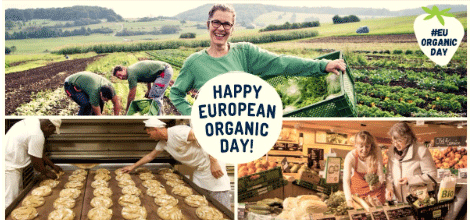September 23rd marks a significant celebration for the organic farming community across Europe: Organic Day. It is a day to recognize the efforts of farmers, entrepreneurs, and innovators who contribute to the sustainable food systems of tomorrow. Spearheading this recognition is the EU Organic Awards, where 24 finalists, including four from Germany, compete in seven categories to highlight the best organic practices in Europe.
Tina Andres, Chairwoman of the German Association for Organic Food Production (BÖLW), emphasized the strength of organic farming even amidst global challenges. “Bio is resilient,” she said, pointing out how consumers and policymakers continue to trust organic agriculture’s benefits for people, animals, and the environment. Benny Schöpf from the Kartoffel-Kombinat, the city of Bremen, SOTO’s organic veggie food company, and B2 Bio pur are among Germany’s proud finalists. “Good organic doesn’t have to be expensive,” Andres remarks, underscoring B2 Bio pur’s ability to serve quality, affordable organic food daily.
While the spotlight shines on these success stories, there are mounting concerns within the industry. One of the most pressing issues is the European Commission’s proposal to deregulate the genetic engineering laws, which many believe could undermine consumer safety and limit choice. BÖLW has organized nationwide campaigns to inform both citizens and lawmakers, ensuring the conversation around gene-free food remains a priority. “The Commission’s plans threaten food safety and consumer choice,” Andres warned. Advocates argue that organic farming research, which promotes climate-resilient crops without genetic engineering, provides a more sustainable and secure solution for future food systems.
Organic farming in Europe is steadily growing, with the EU aiming to have 25% of agricultural land cultivated under organic standards by 2030, part of the Farm-to-Fork strategy. In Germany, the goal is even more ambitious, with the government targeting 30% of organic farmland by 2030. Since 2001, the country has hosted the National Organic Farming Competition, which continues to drive innovation and raise awareness of organic farming’s benefits. These initiatives align with Europe’s broader mission to reduce the environmental footprint of its food production systems while maintaining high standards for food quality.
As Europe celebrates Organic Day, the momentum behind sustainable farming practices is stronger than ever. The EU Organic Awards highlight the innovative spirit driving the organic sector forward, while debates over genetic engineering regulation reveal the delicate balance between progress and safety. Ultimately, the future of farming lies in striking this balance, ensuring that both consumers and the environment are protected while embracing agricultural innovation.































